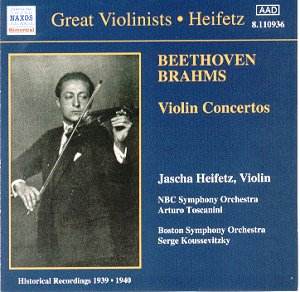These are really splendid transfers by Mark Obert-Thorn
of two famous recordings of the two greatest violin concertos in the
repertoire. It seems superfluous to add that the confluence of Heifetz,
Koussevitzky and Toscanini makes for riveting listening. The Victors
of the Beethoven preserved a performance recorded in Studio 8H and they
bore all the obvious auditory features of that venue of airless deadening
Ė limiting factors mitigated in this transfer to a successful degree.
This performance and that of the Brahms have occasioned considerable
debate Ė pro and contra Ė over the last sixty years, which must indicate
something of their powerful individuality at least. I can imagine strong
and convincing arguments on both sides and my own view is that the Brahms,
though strongly personalised, is the more convincing and sensitive performance.
Toscaniniís accompaniment in the Beethoven is inclined
to abruptness, though he undeniably prepares for the soloistís broken
octaves entry far better than does Bruno Walter for Szigeti in their
performance (also preserved on Naxos 8.110946). Heifetzís seemingly
effortless virtuosity (itís a prerequisite of virtuosity that it "seems"
effortless) is astounding, Toscanini full of complimentary orchestral
clarity and architectural cogency. Heifetz plays his own adaptation
of Auerís cadenza in the first movement. What remains troubling is an
air of fluent certainty. This is not a criticism of Heifetzís peerless
playing in a technical sense Ė rather a sense of not what is present
but what is absent from the performance and what is absent becomes more
distressingly clear in the Larghetto. This is a superficial and rather
decorative, gestural reading laced by Heifetzís luscious tonal resources.
But no more than that. The finale is robust, vigorous Ė though surely
a few of the scratches one can hear were eliminatable? Ė and Studio
8H exaggerates the aggressive precision of the playing. Some of the
lower frequencies are overloaded and an over-congested perspective emerges.
I canít say Toscaniniís conducting here impressed me with welcoming
affection.
Koussevitzky directs a strong, fluid performance of
the Brahms, a work that suited Heifetzís emotive urgency rather better
than the more complex intricacies of the Olympian Beethoven. He engages
in any number of finger position changes that give muscular impetus
and life to the solo line, flecking the first movement in particular
with a spectacular array of ear titillating moments. Some of these are,
admittedly, very spicy indeed and some may well feel him insufficiently
weighty, sacrificing depth for sumptuous incident, rather in the manner
of his fellow Auer-pupil, Toscha Seidel. But Heifetz never loses the
architectural sureties here and is technically on something of a different
plane to his contemporary competitors. Note that he plays the Auer-Heifetz
cadenza in the first movement. I admired the second and third movements.
The Boston oboist is impressive and Heifetz sensitive in the second
movement. In the finale Heifetzís forward motion cannot be, except superficially,
equated with glacial indifference. As with his later recording of the
work with Fritz Reiner, Heifetzís Brahms is a muscular, powerful and
convincing one on its own terms.
Whatever oneís judgement these are durable examples
of superior musicianship Ė though arguably not ones tinged with metaphysical
depths Ė and to have them in such fine transfers, at such superbudget
price, is reward in itself.
Jonathan Woolf
